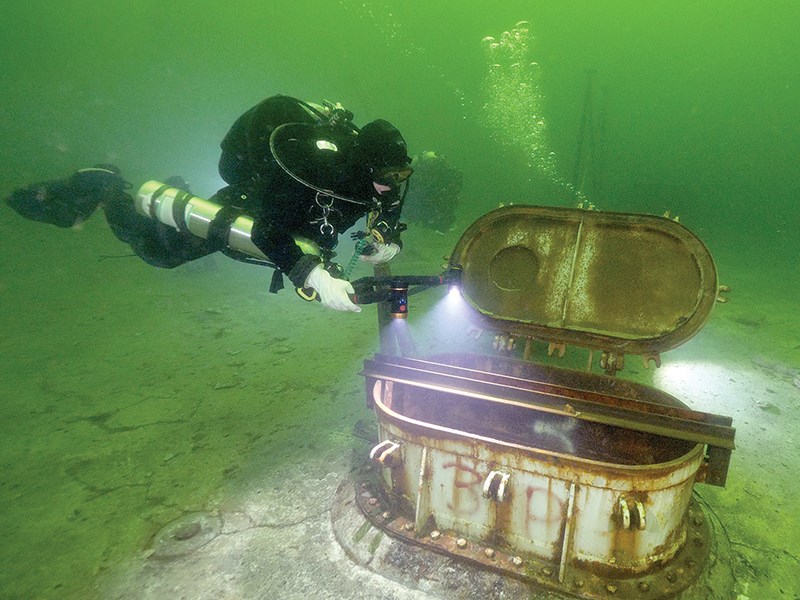Thousands of people lining the shore did not know what to expect when YOGN-82 was sunk off Willingdon Beach on June 23.
The ship is the first of a proposed four vessels Catalyst Paper Corporation and Artificial Reef Society of BC plan to sink, creating an artificial reef unique in the world. The World War I and II concrete vessels have formed the breakwater at the Catalyst mill since the early 1960s.
The excitement on Saturday morning started to build when three tugboats began maneuvering YOGN-82 into the precise location over its final resting place approximately 600 metres off the beach breakwater.
At approximately 11:40 am, a blast of horns indicated a fire-in-the-hole warning, followed by a series of explosive charges set in the hull. The vessel began to sink slowly, then submerged beneath a surge of churning white water bubbling at the surface.
As the spectators dispersed, a handful of people waited in boats on the water, not knowing what to expect when they dove to the ship. They were the lucky ones who were able to dive to it right away.
“There was a fair whack of anticipation simply because we didn't exactly know its attitude and condition,” said Salish Sea Dive owner Gary Lambeth, who has the distinction of being the first person to dive to the sunken ship. “I was pretty darn pleased to find it completely upright and totally intact.”
While the ship will create a new marine habitat, Lambeth said there is already life from when it was anchored at the Catalyst mill.
“It's been out there for a long time, so every part of the hull below the waterline was already covered with anemones, starfish, barnacles and lots of sea life,” he said.
For the last three years, Lambeth and Powell River’s diving community has worked with the Artificial Reef Society and Catalyst, which spearheaded the project.
“It couldn't have gone much better,” said Catalyst Powell River Division environmental manager Phil Lum. “We had a slight hiccup the first time we tried to detonate the charges but we got past that and it was only about a five-minute delay. It sank real nice, it sank true and it sits on the bottom pretty much where it should be.”
For some residents of Powell River, there was sadness seeing YOGN-82 sink, but Lum said Catalyst cannot continue to maintain the vessels in their current location and condition. Other options, including towing it out to sea or putting it in landfill, were not viable.
“To be beneficial for the environment and the community of Powell River with the increased dive tours, this was the way to go,” said Lum. He added that Catalyst is looking at the reef project over a three-to-five year timeline.
“We're not entirely sure which one is going to be moved over next,” said Lum.
Until then, YOGN-82 is already attracting attention from the dive community near and far. Lambeth said people are already enquiring about getting recertified for diving and booking charters to see it.



